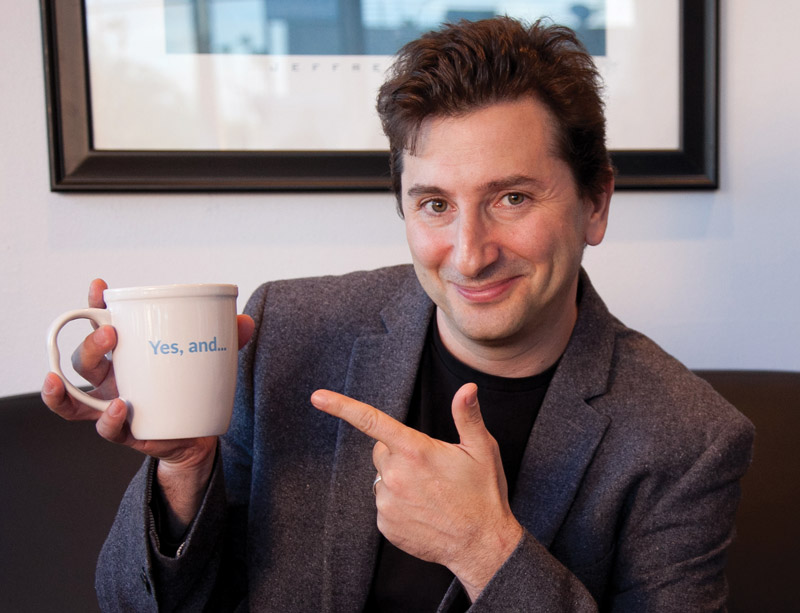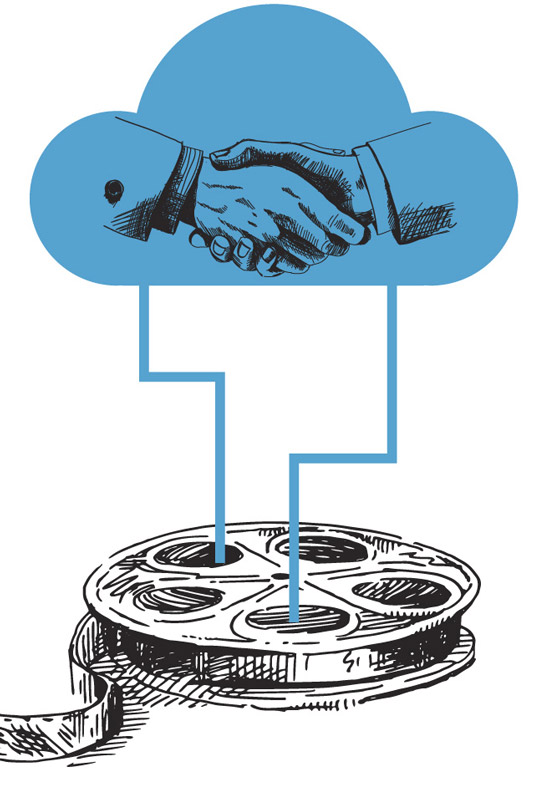As Good as It Gets

Jason Kassin ’90, cofounder of FilmTrack Inc., the leading content and rights management software platform for the worldwide film and television industry, has a coffee mug on his desk that has the company logo on one side and the words “Yes, and” on the other. “That’s the main tenet of improv and FilmTrack,” Kassin says. “You don’t pause, you don’t negate, and you don’t ask questions. You say, ‘Yes, and.’ That’s how you move things forward. Our engineers, our sales people, our technology people all embody the ‘Yes, and’ philosophy.” Kassin was one of the earliest members of Vassar Improv, still one of the most popular student organizations on campus. His company coffee mug is just one small expression of his ongoing connection to the college.
“Vassar was one of the most pivotal experiences in my life,” says Kassin. “Senior year I went to an event organized by the film department, a panel of Vassar graduates in the industry, and they all told their stories. And they were all like, ‘And then I knew this guy, and that’s how I got this job, and then I got involved in X-Y-Z.’ Every story seemed to hinge on the people they knew. During the Q-and-A session someone asked, ‘I don’t know anybody, so how am I going to break into the business?’ And one of the panelists said, ‘Look around this room. These are your relationships. These are your connections.’ And never a more truthful thing was said. To this day, 24 years later, my Vassar friendships are my relationships, my connections, my inner circle—and not just from a business perspective, but on a human level, in terms of offering advice and counsel and sharing experiences.”

Kassin grew up in Brooklyn. His father died when he was young, and the family struggled financially. “We were on public assistance,” says Kassin. “I remember when Vassar asked for my mother’s tax return. There was no tax return, because there was no money.” Kassin applied to a number of colleges, and Vassar gave him the best financial-aid package.
Kassin’s first year at Vassar wasn’t entirely smooth sailing. “I came to Vassar with a mullet, a thick Brooklyn accent, and a jean jacket with Ozzy Osbourne painted on the back. That first day on campus, I was meeting people who’d spent their summer in England, and I’d never even been on a plane, so it was a real adjustment for me.”
A graduate of Midwood High School in Brooklyn (where, incidentally, he and filmmaker Noah Baumbach ’91 first met), Kassin had a strong background in the sciences but not so much in the humanities. At Vassar, he took everything—biology, French, film, drama, art history, Japanese art, science, and technology. “I felt like my brain was getting supercharged,” he recalls.
At the same time that he was soaking up the intellectual stimuli, outside the classroom he was having a blast—living in Joss, playing in a band, being in shows, doing improv. “I was also involved in VC-TV, which Liz Murdoch [also class of ’90] launched,” Kassin says. “Noah, Liz, Chris [Reed ’89], John [Gatins ’90, his roommate for three years, now an Oscar-nominated screenwriter], and I created all of these bizarre shows that had no plot. We’d get up on a Sunday morning and say, ‘Hey, let’s go make a sword-and-sorcery movie.’ ”
While at Vassar, Kassin was also earning money writing software for the New York City Board of Education and the Rockefeller Foundation. “When I was in high school, I wanted to become a writer and an actor and a comedian,” says Kassin, “but, at heart, I’ve also always been a computer geek.” A friend of his family got him a summer job at the Board of Education in the Office of School Food and Nutrition Services. “They were feeding millions of kids a day, and they were having problems tracking everything. So I said, ‘You know, I think I could write software that could manage all of this pretty easily.’ So I did. A lot of guys my age were really interested in making video games, and I was too. But for some reason, I’m really into databases. I’m really good at organizing. Probably a therapist would say that I have OCD or something. But I like to improve things. I like to fix things.”

After graduation, Kassin worked as a computer consultant for a couple of years in New York but “just hated being in a suit.” Baumbach at that point was making his first movie, the indie hit Kicking and Screaming, and Kassin moved out to Los Angeles to be in the film.
At that time, Ling Chan ’91 (John Gatin’s spouse) was working for a company called Overseas Filmgroup. “They were having all of these problems with their computers, and she asked if I could help out. The owner of the company was making these foreign art-house films, like The Scent of Green Papaya and Antonia’s Line. He was making movies, acquiring movies, selling movies, distributing movies—he was doing everything that a Warner Brothers or a Lionsgate does, but on a smaller scale. So I began to develop programs and systems to manage all of the different parts of what he was doing, and he kept telling me that the software was incredible and that I should go sell it and make a business out of it. And I said, ‘No, no, no—I’m going to be a screenwriter. I’m an actor. I’m not interested in that.’ ”
Around that time, he sold his first screenplay, coauthored with another Vassar friend, Will Baum ’90, to DreamWorks for “what was at the time an enormous amount of money.” But in 2001, he got a call from his agent with some sobering news: “Listen,” his agent said, “there’s going to be a big strike, and you may not work again for a while, so I hope you squirreled some money away.” That same day, his wife called to tell him she was pregnant with their first child.
“I had just spent every dime I had on a house, and I’m thinking: This is awful. Oh my God, I’m never going to work again. So I called my brother, who had just moved to L.A., and I said, ‘Listen, I have this verkakte software that I wrote for this film company that everybody seems to think is fantastic. If you can sell it, it’s Plan B in case there’s a writers’ strike.’ ” Within two months, Kassin’s brother had sold the software to film companies in the Netherlands, New York, and Los Angeles.
Meanwhile—there was no strike, and Kassin kept writing. Over the next few years, he and his brother built FilmTrack with the money he was making writing for television and film. “Every time we were low on funds, my brother would say, ‘Go write another pilot,’ and then we’d take that money and invest all of it into the company.” They were able to grow FilmTrack, hire employees, secure clients, and grow revenues without taking a dime from outside investors.
Today, FilmTrack has two offices, 70 employees, and a client roster that includes major industry players like CBS, DreamWorks Animation, Miramax, Starz, and the Weinstein Company. FilmTrack provides an integrated suite of software solutions that enables these companies to effectively manage their intellectual properties from ideation to production to distribution.
Kassin uses Miramax as an example: “They’ve got over 700 titles in their portfolio and over 300 in development. They have a sales team that is out there all over the world trying to sell these titles, and they need to know what titles are available, what rights are in play, and what the terms are. There are a lot of variables.”
The FilmTrack technology provides sales teams, like Miramax’s, with immediate access to this detailed data, enabling companies to close deals faster and squeeze the most revenue out of their film libraries. This used to take days, sometimes weeks, with multiple spreadsheets and systems. Now, if a television station in Australia wants to buy a feature from Miramax, the sales rep can immediately find out what titles are available and what the rights are and actually deliver the asset to the buyer from the Cloud.
For Kassin, Vassar relationships are key. Over the years, FilmTrack has employed many Vassar alumnae/i, including Brigitte Adams ’94, Max Gold ’10, Jon Bing ’90, Elizabeth Jordan ’10, Felix Steiny ’09, Michael Gerbosi ’88, and others. “Part of that is tribalism,” says Kassin, “but it’s also because if you went to Vassar, or somewhere similar, I can be almost 100 percent sure that you know how to write.”
Because of his Vassar relationships and the relationships he created during those years as an actor, a writer, and a stand-up comedian, Kassin has a unique selling advantage. “When I go into a meeting with a film company exec, I’m not coming in as a software guy. I’m coming in as someone who understands their lexicon—the process of how film and television actually get made—and what is needed from a technology perspective to help solve their business needs.”
Kassin says someone recently asked him which he liked better, writing screenplays or writing software. “I said, ‘Well, one is a very creative, collaborative process that involves a lot of artistic thinking and problem solving … and the other is screenwriting.’ ”
